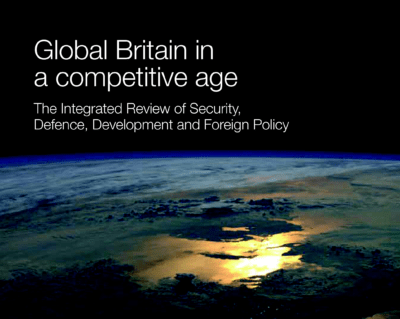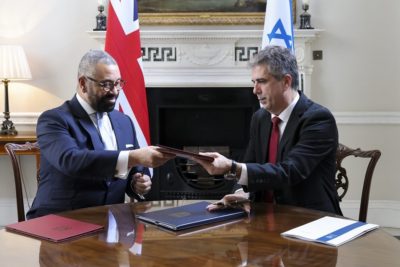The Integrated Review: enmeshing and strengthening the military

The government’s Integrated Review of Security, Defence, Development and Foreign Policy was published on 16th March to considerable clamour. Following close on its heels, the publication of a Defence Command Paper announces a series of additional measures relating to the future of the armed forces.
The Integrated Review includes a pledge to increase the number of nuclear weapons, new approaches to state rivals like China and Russia, an expansion of cyber operations, and a general foreign policy reset for the post-Brexit Age. The Command Paper reduces the size of the armed forces in favour of the development and use of high-tech equipment and weaponry, and increases the size and use of special forces across the world.
Launched by Boris Johnson with familiar rhetoric of making ‘the United Kingdom stronger, safer and more prosperous while standing up for our values’, the Review puts forward a vision for the country’s relationship with the rest of the world which is often contradictory and ill-thought through in terms of translating rhetoric into reality; the document feels more like a manifesto than a plan. Its title recycles a popular policy trope and combines it with a sense of renewed belligerence: Global Britain in a competitive age.
There is a particular tension between the competitiveness that provides rationale for the strategy and the international collaboration required to make vital progress on stated objectives of tackling the climate emergency and pandemic response.
There is a particular tension between the competitiveness that provides rationale for the strategy and the international collaboration required to make vital progress on stated objectives of tackling the climate emergency and pandemic response. This is evident within policy areas; for example, the Review pledges “to promote a free, open, peaceful and secure cyberspace” but also to use the same technology to “detect, disrupt and deter our adversaries”.
The Review reinforces trends that ForcesWatch and other civil society organisations have been monitoring: the harnessing of civil society towards military and defence interests, prioritising trade over the climate emergency and human rights, and the development of emerging technologies and new generation military hardware with inadequate regulatory and political oversight. There is little acknowledgement of the public debates that should be accompanying these significant developments and shifts, even within the current Prime Minister’s version of an ‘open society’.
Enmeshing military and civilian, war and peace
The Review pulls together and builds on a number of developments in defence thinking already taking place, notably the Fusion Doctrine developed by the National Security Capability Review in 2018, which established a cross-departmental ‘whole-of-government approach’ to national security. In setting out the vision for integrating defence and security with international development goals and wider foreign policy, the publication of the Review was preempted by the merging of the Department for International Development into the Foreign and Commonwealth Office in the summer of 2020. Many feared that this would undermine the UK’s input into development support for lower income countries and would be an unequal partnership.
Last November’s announcement of a large increase to the defence budget at the same time as an unprecedented decrease to the international aid budget suggests these fears were well-founded. Does ‘integrated’ thinking, where all foreign policy is tied to a single strategy, lead to an either/or rather than both, approach to funding?
In response to these perceived threats, the government’s reaction is to also increasingly blur the boundaries between military and civilian and ‘between war and peace’.
More generally, the ‘fusion’ or ‘integrated’ thinking laid out in this Review suggests that the ‘whole of society’ – ‘the wider private sector, civil society and the public’ – will be strategically harnessed for national security and ‘building resilience’ in response to wider threats and hazards but also specifically in relation to defence objectives.
“It is a response to the fact that adversaries and competitors are already acting in a more integrated way – fusing military and civilian technology and increasingly blurring the boundaries between war and peace, prosperity and security, trade and development, and domestic and foreign policy. It also recognises the fact that the distinction between economic and national security is increasingly redundant.” (page 19)
In response to these perceived threats, the government’s reaction is to also increasingly blur the boundaries between military and civilian and ‘between war and peace’. Focusing thinking on what is now often characterised as the ‘grey zone’ is becoming commonplace in western democracies. The Review pledges:
“To use our armed forces to detect, understand and deter state threats below the threshold of war through persistent engagement overseas” (page 75)
This approach was publicly introduced in last year’s document from the MoD on the Integrated Operating Concept, which set out a “new approach to the utility of armed force” which will “lead to a fundamental transformation in the military instrument and the way it is used”.
Consciously developing a state of constant military activity to respond even to threats “below the threshold of war” rather than genuinely working towards a peace that is not reinforced with military backup, is emblematic of a militarist mindset.
Consciously developing a state of constant military activity to respond even to threats “below the threshold of war”, moving “seamlessly between ‘operating’ and ‘warfighting’” and always preparing for war, rather than genuinely working towards a peace that is not reinforced with military backup, is emblematic of a militarist mindset. Instead of a post-pandemic reset in global politics, it looks like the UK will continue military training in countries with poor human rights records and the military industrial complex will be strengthened with support prioritised for security and defence technologies.
Defence as an industrial strategy
The Review pledges a new defence and security industrial strategy but indicates it will focus government investment towards industry “required for national security and operational reasons” and in “priority equipment and technologies to meet national security requirements”. It is via this innovation that the government will “support prosperity and growth in the wider economy”. The specific examples listed, “from building ships in Scotland and armoured vehicles in Wales, to manufacturing aircraft in England and satellites in Northern Ireland”, indicate that a large focus will remain on military hardware as well as the demands of the MoD’s Science and Technology Strategy, published last year.
Putting defence and security production at the heart of government industrial strategy and as a route of prosperity, is not the response needed for the climate emergency and wider human security.
However, in the name of ‘modernisation of our armed forces’ the military are also embracing a host of high-tech weapons with a staggering £80bn over the next four years. The Integrated Review promises over the same period “at least £6.6 billion of defence funding in advanced and next-generation R&D to deliver an enduring military edge in areas including space, directed energy weapons, and advanced high-speed missiles”, as well as MoD innovation hubs and Accelerator industrial challenges.
Putting defence and security production at the heart of government industrial strategy and as a route of prosperity, is not the response needed for the climate emergency and wider human security. And the ‘technical fix’ approach does not acknowledge the political debate and regulation needed for these developments which will undoubtedly have an impact on the world in many foreseen and unforeseen negative ways. The Review seems to have responded to the fear stated by a senior government official that, “everyone from terrorists to other nations have modern equipment and killer drones” with an arms race of its own.
Nukes
The number of nuclear weapons held in UK arsenals is set to increase by one third and be extended to possible non-nuclear conflict uses. The report acknowledges previous commitments to reduce warhead numbers, but argues that:
“In recognition of the evolving security environment, including the developing range of technological and doctrinal threats, this is no longer possible, and the UK will move to an overall nuclear weapon stockpile of no more than 260 warheads.” (page 76)
On the one hand the Review states that, “we remain committed to the long-term goal of a world without nuclear weapons”; on the other, the UK will reserve the right to use nuclear weapons against non-nuclear states which possess other weapons of mass destruction, including ‘emerging technologies’ and will reduce scrutiny by no longer publishing information about the UK’s stockpile of nuclear weapons. It has refused to sign the UN Treaty on the Prohibition of Nuclear Weapons which came into force in January this year.
This has led to widespread criticism from organisations like CND, arguing that as a reversal of older international treaty obligations this move is not legal.
Nation states
It has been suggested in the press that China and Russia hawks will be disappointed by the language in the Review in relation to those countries.
There is some mention of human rights concerns with, for example, China, but this appears to be tempered by a desire to still do business with one of the world’s most powerful economies:
“We will continue to pursue a positive trade and investment relationship with China, while ensuring our national security and values are protected.” (page 22)
This tension is currently playing out as the Trade Bill goes through parliament; the House of Lords recently backed an amendment to stop deals being done with countries which have committed genocide. As if to prove that the demands of trade and human rights values can be managed, the UK has subsequently sanctioned four chinese officials for human rights violations against Uighurs.
But, disturbingly, a comment from Foreign Secretary Dominic Raab leaked after the review seems to suggest that the government will further expand relationships with nations whose human rights records have attracted censure in the past.
International aid and development
The Review sets out the government’s international aid priorities as:
“[C]limate and biodiversity; global health security; open societies and conflict resolution; girls’ education; humanitarian preparedness and response, especially food security and famine prevention; S&T; and trade and economic development.” (page 46)
At the same time, the aid budget has been significantly cut. A highly critical piece by Scientists for Global Responsibility based on bottom-line changes to funding allocations, sums up the shift away from non-military international responsibilities as “side-lining a broader approach to security: poverty and the climate crisis”. SGR’s conclusions are worth reproducing here:
“The government’s Integrated Review of Security, Defence, Development and Foreign Policy was widely trailed in the media as “the most radical reassessment of Britain’s place in the world since the end of the Cold War”. In reality, it mixes grand ethical aspirations with many of the most militaristic and aggressive elements of the UK’s late twentieth century policies – such as ‘Great Power’ rivalry, technological arms racing (including with weapons of mass destruction), uncritical nationalism, and failure to give adequate help to the world’s poorest. It then adds a new, high technology edge to them. Given over 125,000 British people have died in the COVID-19 pandemic, and the nation has one of the highest death rates from this disease in the world, it is not hard to see how badly the government is failing to live up to its own rhetoric of protecting its citizens – let alone improving security elsewhere.”
Climate
The review makes a number of positive pledges on climate change, including to speed up the UK’s transition to net zero, strengthen adaptation to effects which cannot be reversed and do more to protect biodiversity.
However, there is criticism of the lack of priority that action on the climate emergency has been given. As Rethinking Security points out:
“Saying that ‘HMG will make tackling climate change and biodiversity loss its number one international priority’ is good but the Review’s helpful breakdown of applied funding clearly shows that it falls way behind resourcing the military.”
Rethinking Security, and partner organisations like SGR, will be working to develop an alternative security strategy over the next three years which prioritises wider human, rather than purely national, security.
Defence Command Paper
The Defence Command Paper linked to the Integrated Review includes cuts to military personnel numbers by 10,000, the adoption of new and high-tech hardware, and plans for a new quasi-special forces unit.
The Paper was ‘leaked’ to the media over last weekend, ensuring significant coverage of its key messages. The BBC summed up the shift in emphasis as:
“There will be extra money to fight in the new domains of space and cyber, and for robots and drones. The MoD says troops will be better equipped, but there will be fewer of them.”
Other outlets announced the new kind of troops as US-style ‘Ranger’ or ‘Green Beret’ troops, saying the first battalion will be operational by early 2022 and that Mozambique and Somalia are possible first deployments. Few have mentioned the lack of external oversight of special forces activity that will become a greater concern as their missions are extended.
The Telegraph carried a report that a warship would be permanently deployed to Gibraltar, the first time a ship has been permanently deployed in a British Overseas Territory, representing a new approach of “globally engaged, constantly campaigning and forward deployed”.
Defence secretary Ben Wallace’s speech to parliament on the Command Paper confirmed most of these reports and the Command Paper has now been published and we will be examining beyond the headline messages more closely.
Few voices are questioning the ethics and impact of a strategy for the UK’s defence and now integrated foreign policy that is based upon a state of permanent low-level war
Wallace warned against using the “shield of sentimentality to protect previously battle-winning but now outdated capabilities”. He also implied that despite new increases in defence funding, ‘under-resourcing’ is still an issue:
“It would, of course, similarly endanger our people if we simply wielded a sword of cuts, slicing away the battle-proven on the promise of novelty, without regard for what is left behind. Old capabilities are not necessarily redundant, just as new technologies are not always relevant – we must employ both ‘sword’ and ‘shield’.”
More concrete announcements included more money for better living accommodation, interim ship missiles, £23bn on developing the army, updating attack helicopters, and a (predicted) larger focus on cyber and space warfare.
Echoing the Integrated Review, Wallace used his speech to prepare the country for the ‘grey zone’ concept of ‘persistent engagement’:
“The notion of war and peace as binary states has given way to a continuum of conflict, requiring us to prepare our forces for more persistent global engagement and constant campaigning – moving seamlessly from operating to war fighting if that is required.”
While many are focused on some of the more measurable consequences of this kind of thinking, such as cuts to armed forces personnel or ‘modernisation’ of military weaponry, few voices are questioning the ethics and impact of a strategy for the UK’s defence and now integrated foreign policy that is based upon a state of permanent low-level war.
See more: legislation & policy, military in society, security, Fusion/integrated defence concept, arms industry, defence & foreign policy
Like what you read?
> Sign up for our newsletter or blog notifications
> Support our work – from just £2 a month










